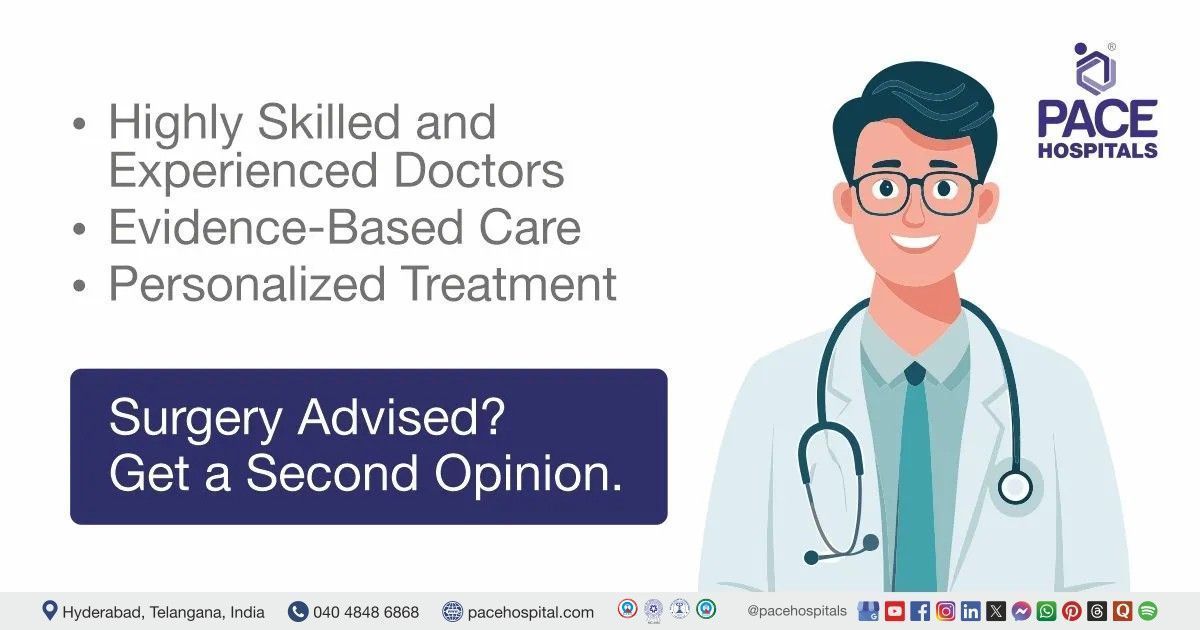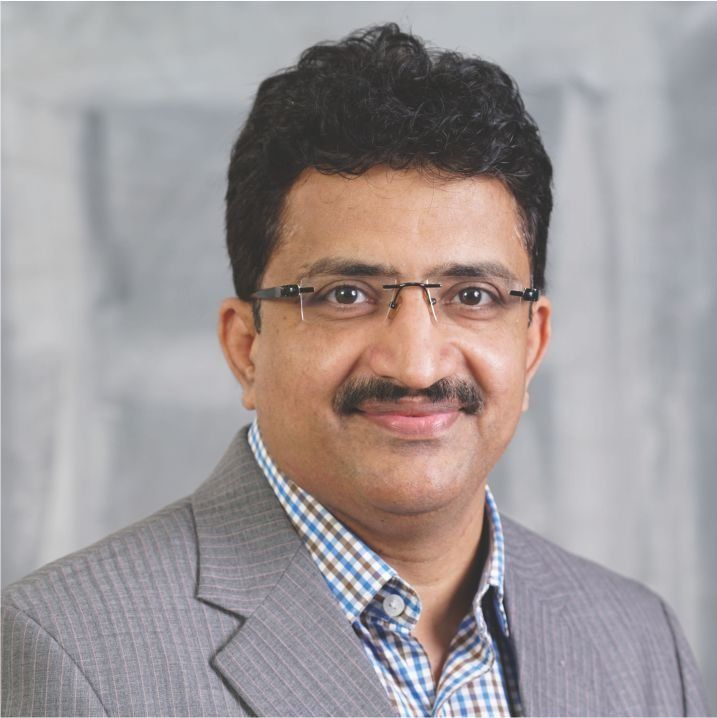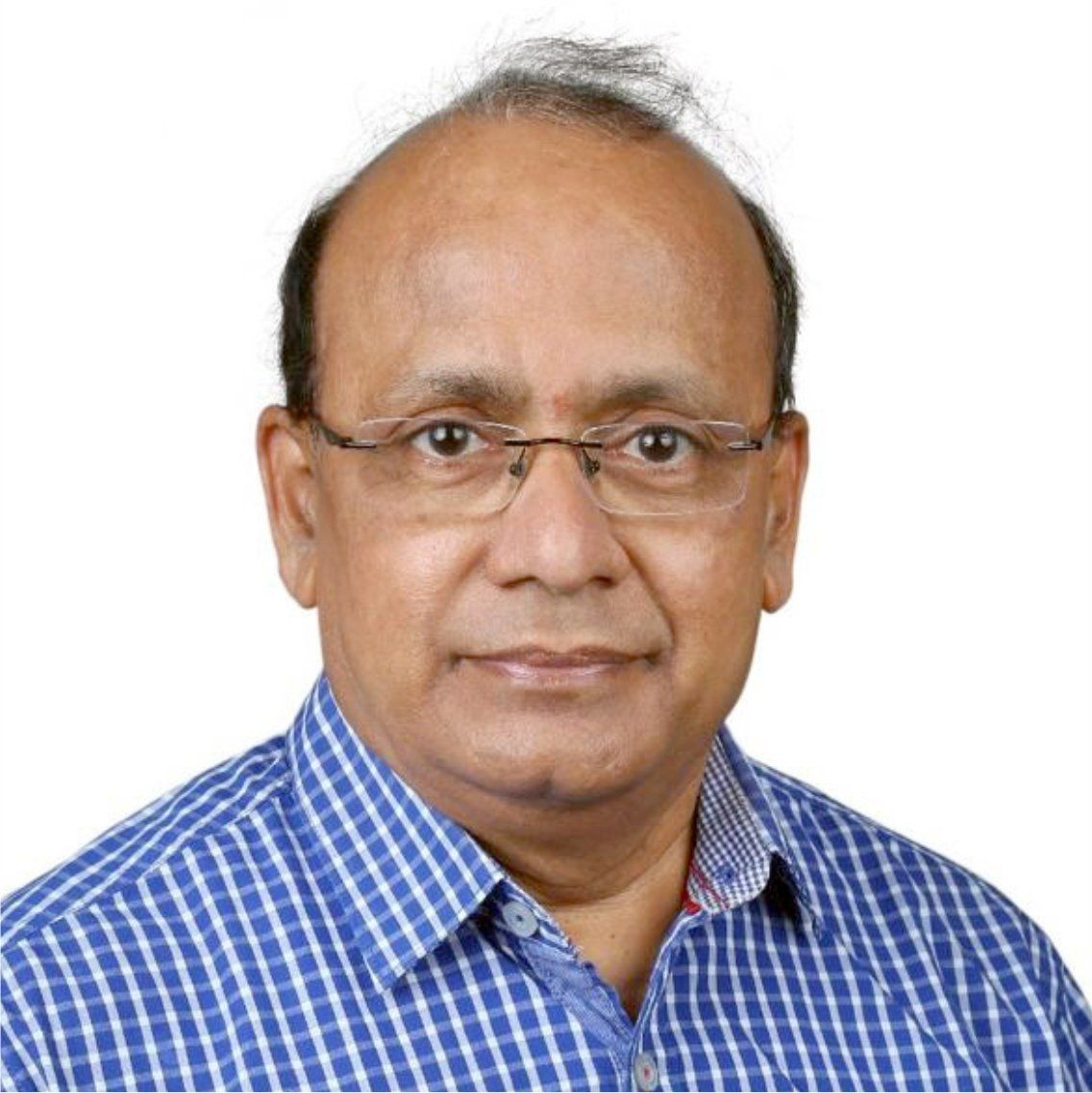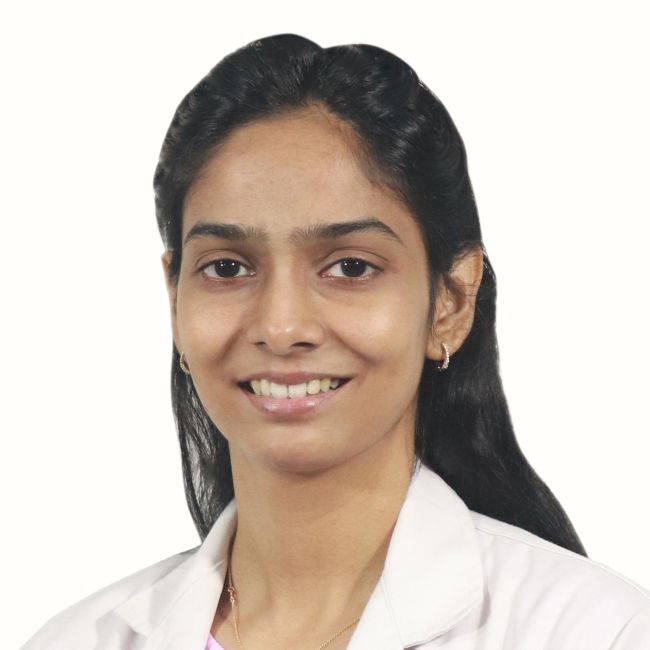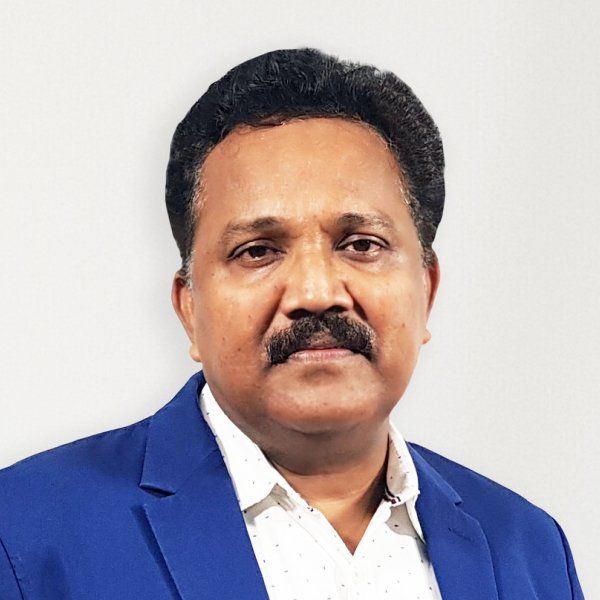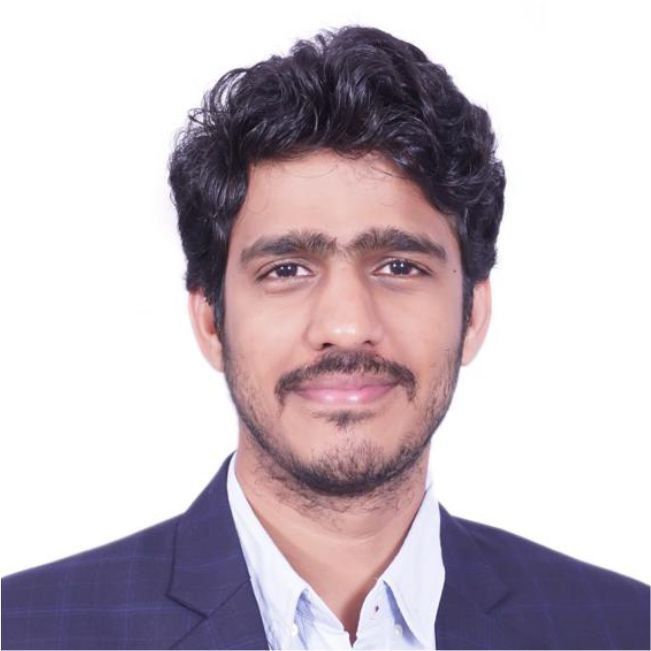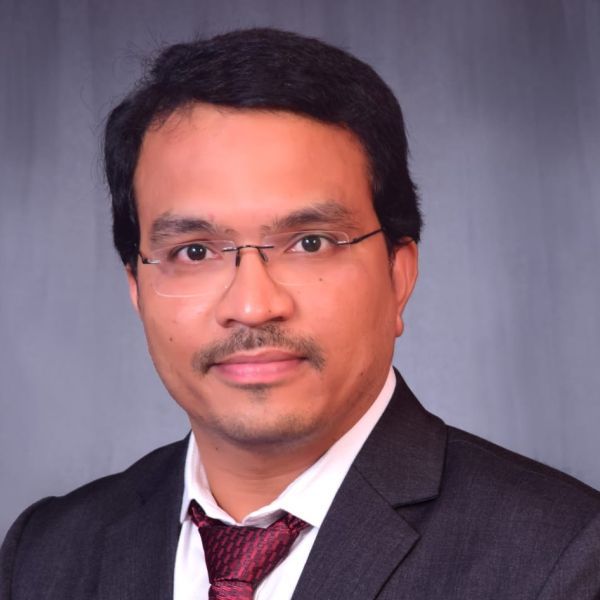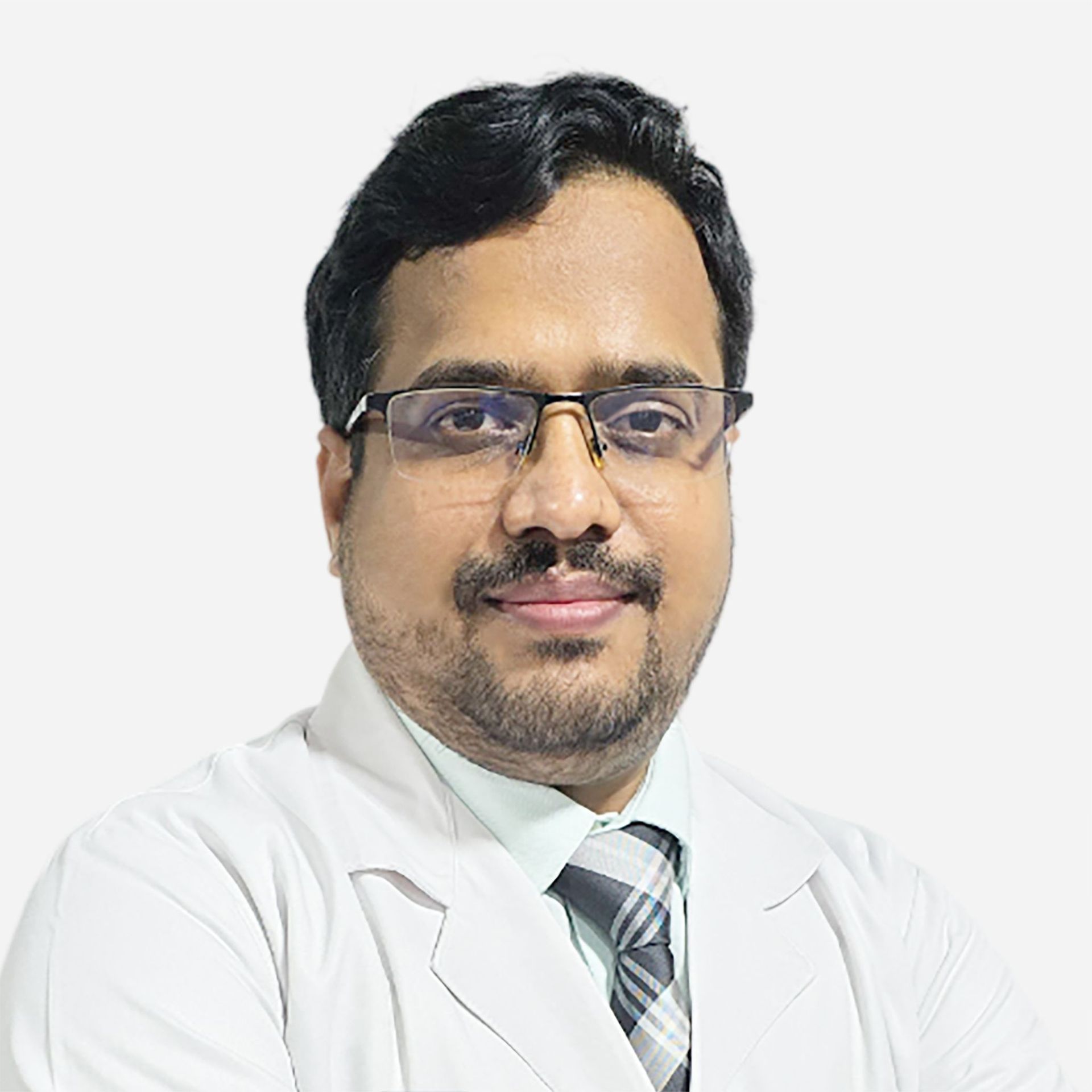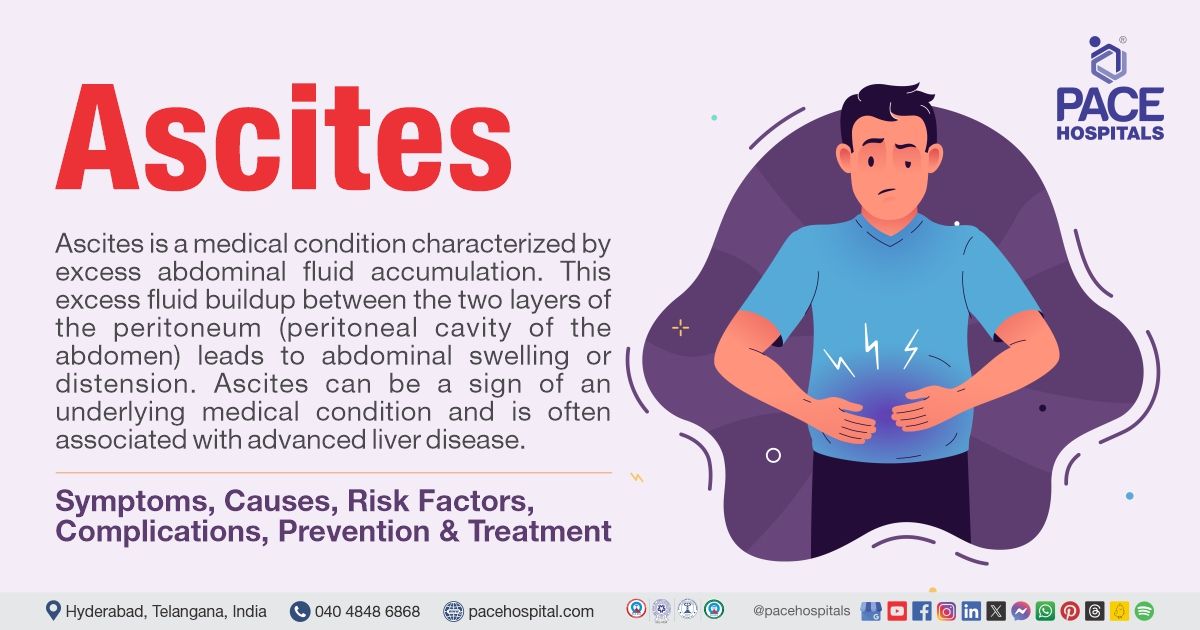Best Ascites Specialist in Hyderabad for Accurate Diagnosis & Advanced Treatment
PACE Hospitals
✅ Recommended by 9,452 Happy Patients. Get hassle-free appointments with Ascites Doctors.
Dr. Govind Verma
MD, DM (Gastroenterology), Fellowship in EUS
Experience : 30+ years
Interventional Gastroenterologist & Hepatologist
Specialist
Functional and Motility Disorders: Constipation and fecal incontinence, Gastroparesis, Functional abdominal pain, Hirschsprung’s disease, Diffuse esophageal spasm
Esophagus Disorders: Acid reflux / GERD (Gastroesophageal Reflux Disease), Achalasia cardia, Esophagitis, Esophageal varices, Barrett's esophagus, Esophageal cancer
Stomach Disorders: Gastritis, Peptic ulcers, Stomach cancer, H. pylori infection, Functional dyspepsia
Small and Large Intestine Disorders: Irritable Bowel Syndrome (IBS), Inflammatory Bowel Disease (IBD) (Ulcerative colitis, Crohn’s disease), Celiac disease, Intestinal infections, Colorectal cancer, Diverticulitis, Intestinal obstruction, Constipation and chronic diarrhea, Gas and bloating
Rectal and Anal Conditions: Hemorrhoids (Piles), Anal fissures, Anal fistulas, Rectal bleeding, Proctitis
Liver Diseases: Hepatitis A, B, C, E; Fatty liver disease (NAFLD/NASH), Liver cirrhosis, Liver cancer (Hepatocellular carcinoma), Autoimmune hepatitis, Wilson’s disease, Hemochromatosis
Gallbladder and Bile Duct Disorders: Gallstones, Cholecystitis, Bile duct obstruction, Cholangiocarcinoma (bile duct cancer), Primary sclerosing cholangitis (PSC)
Pancreatic Diseases: Acute and chronic pancreatitis, Pancreatic pseudocysts, Pancreatic cancer, Exocrine pancreatic insufficiency
Expertise
Endoscopy (Upper GI, Colonoscopy, Sigmoidoscopy), Capsule endoscopy
Endoscopic Retrograde Cholangiopancreatography (ERCP)
Polypectomy, Biopsies of the GI tract, PEG tube insertion
Endoscopic Ultrasound (EUS) and EUS-Guided Interventions: EUS-guided biopsies, EUS-guided pancreatic pseudocyst drainage, Biliary and pancreatic duct stenting
Third-Space Interventional Endoscopy: POEM (Peroral Endoscopic Myotomy), ARMS (Antireflux Mucosal Resection), GERD-X procedure for reflux disease
Advanced Endoscopic Bariatric and Oncology Procedures: Endoscopic Sleeve Gastroplasty (ESG), Endoscopic Submucosal Dissection (ESD), Endoscopic Mucosal Resection (EMR)
Comprehensive Hepato-Biliary and Pancreatic Interventions
Consultation Details
Languages Spoken: English, Hindi, Telugu, Marathi
Timing: Mon to Sat - 10 AM to 6 PM
Location: PACE Hospitals, HITEC City & Madinaguda
Dr. M Sudhir
MBBS, MD (Internal Medicine), DNB (Internal Medicine), DNB (Gastroenterology), FICP
Experience : 40+ years
Sr. Gastroenterologist and Hepatologist (Liver Specialist)
Specialist
- Inflammatory Bowel Diseases (IBD): Ulcerative colitis, Crohn’s disease
- Gastrointestinal Motility Disorders: Achalasia cardia, Hirschsprung’s disease, Diffuse esophageal spasm
- Pancreatico-Biliary Disorders: Acute and chronic pancreatitis, Pancreatic pseudocysts, Common bile duct (CBD) stones, Gallstones, Biliary and pancreatic malignancies
- Functional Bowel Disorders: Constipation, Irritable Bowel Syndrome (IBS), Gastroparesis, Functional abdominal pain
- Liver Diseases: Chronic liver disease, Hepatitis, Cirrhosis and liver-related complications
Expertise
- Diagnostic Procedures: Endoscopy (Upper GI, Colonoscopy, Sigmoidoscopy), Capsule endoscopy, ERCP (Endoscopic Retrograde Cholangiopancreatography)
- Advanced and Therapeutic Endoscopy: Third-Space Endoscopy Techniques, POEM (Peroral Endoscopic Myotomy) for achalasia, Endoscopic Sleeve Gastroplasty (ESG) for obesity, Endoscopic Ultrasound (EUS) for pancreatic, biliary, and GI evaluation
Consultation Details
Languages Spoken: English, Hindi, Telugu
Timing: Mon to Sat - 9 AM to 1 PM
Location: PACE Hospitals, HITEC City
Dr. Padma Priya
MBBS, MD (Internal Medicine), DrNB (Medical Gastroenterology)
Experience : 9+ years
Consultant Gastroenterologist and Hepatologist
Specialist
Specialist in gastrointestinal (GI), pancreatic and hepatic diseases such as gastroesophageal reflux disease (GERD), anal and rectal disorders such as piles (hemorrhoids), anal fissures and anal fistulas, Inflammatory bowel disease (Ulcerative colitis and Crohn’s disease), Inflammatory bowel Syndrome, Peptic ulcers, Celiac disease, GI infections, Gallbladder stones, Biliary tract disorders, Liver diseases, Pancreatic disorders, Gastrointestinal bleeding, Diverticulitis, Eosinophilic Gastroenteritis, Gastrointestinal motility, Gastrointestinal cancer, Malabsorption Syndromes etc.
Expertise
ERCP, EUS, Colonoscopy, Sigmoidoscopy, Capsule endoscopy, Endoscopic mucosal resection, Endoscopic ultrasound-Fine needle aspiration / Fine needle biopsy, Polypectomy, Esophagogastroduodenoscopy (EGD), Endoscopic ultrasound (EUS)-guided, Cystogastrostomy, Spiral enteroscopy, Oesophageal manometry, Ano-rectal manometry, PEG tube insertion, Narrow-band imaging, Endoscopic variceal ligation, Argan plasma coagulation, Haemoclip deployment, NJ Tube placement, Oesophageal bougie dilation, Achalasia balloon dilation, Colonic stricture dilation, Pyloric balloon dilation, etc.
Consultation Details
Languages Spoken: English, Hindi, Telugu
Timing: Mon to Sat - 10 AM to 6 PM
Location: PACE Hospitals, HITEC City & Madinaguda
Dr. CH Madhusudhan
MBBS, MS - General Surgery (Osmania Medical College, Hyderabad, Telangana), FRCS (UK), MCh - Surgical Gastroenterology / G.I. Surgery (AIIMS, New Delhi), Liver Transplantation (USA)
Experience : 29+ years
Senior Consultant Surgical Gastroenterologist and Liver Transplant Surgeon
Specialist
Specialist in Surgical Gastroenterology, Liver resection (hepatectomy procedure), Advanced Laparoscopic Surgery, Minimally Invasive Hepato-Pancreato-Biliary (HPB) Surgery, Transplant Surgery, Upper GI Surgery, Abdominal Wall Reconstruction, Robotic Surgery, GI Oncology, Bariatric (Weight Loss) Surgery.
Expertise
Gastrointestinal Surgeries for Upper Gastrointestinal (GI) Diseases
- Esophagus: Esophagectomy for esophageal cancer, Nissen fundoplication for anti-reflux surgery, Laparoscopic Heller procedure (cardiomyotomy) for achalasia cardia
- Stomach: Vagotomy for peptic ulcer disease, Endoscopic sleeve gastroplasty (ESG) for bariatric weight loss, Endoscopic gastric balloon for bariatric weight loss
- Hernia Repair: Robotic and laparoscopic (minimally invasive) surgery for inguinal hernia, femoral hernia, umbilical hernia, paraesopageal hernia, incisional hernia, epigastric hernia, hiatal hernia and parastomal hernia
- Small Intestine: Diverticular disease and diverticulitis surgery, Lower Gastrointestinal (GI) Diseases
- Colon: IBD surgery for Crohn's disease and ulcerative colitis, Laparoscopic/open rectal prolapse
- Rectum: Laparoscopic/open rectal prolapse, laser treatment for piles, hemorrhoidectomy
- Liver Diseases: Laparoscopic/open surgery for liver cancer, cirrhosis of the liver, liver benign cysts, and infections, Liver transplantation
- Gallbladder and Bile Duct Diseases: Laparoscopic/open surgery for gallbladder stones, gallbladder cancer, bile duct stones, and bile duct cancer
- Pancreas Diseases: Laparoscopic and endoscopic cooperative surgery for chronic pancreatitis, necrotizing pancreatitis, pancreatic pseudocysts, pancreatic and duodenal cancer
- Bariatric/Metabolic Surgery: Sleeve gastrectomy, Endoscopic gastric balloon for bariatric weight loss, Mini gastric bypass, Gastric bypass (Roux-en-Y)
- Other: Venous shunt for portal hypertension
Consultation Details
Languages Spoken: English, Hindi, Telugu
Timing: Mon to Sat - 3 PM to 6 PM
Location: PACE Hospitals, HITEC City
Dr. Suresh Kumar S
MBBS, MS (General Surgery), M.Ch (Surgical Gastroenterology)
Experience : 14+ years
Surgical Gastroenterologist, Minimally Invasive GI Surgeon and Advanced Laser, Laparoscopic Surgeon
Specialist
Specialist in gastrointestinal, pancreatic and hepatic diseases such as cirrhosis of the liver, gastroesophageal reflux disease (GERD), hernias, piles, hemorrhoids, anal fistula, anal fissure hernias, chronic pancreatitis, hepatitis, non-alcohol-related fatty liver disease (NAFLD), colon and rectal cancer, appendicitis, bile duct stones etc.
Expertise
Liver resection (hepatectomy procedure), Laparoscopic cholecystectomy, laparoscopic common bile duct exploration (LCBDE), laparoscopic inguinal hernia and ventral hernia repair, laparoscopic fundoplication, laparoscopic hemicolectomy, laparoscopic low anterior resection, laparoscopic abdominoperineal resection, laparoscopic gastrectomy, stapled hemorrhoidectomy, laparoscopic appendectomy, bariatric surgery, lateral pancreaticojejunostomy, laser for piles, Whipple procedure (pancreaticoduodenectomy), hepatectomy, distal pancreatectomy etc. His special interest lies in diagnosing and treating gastroesophageal reflux disease and complex hernias, in addition to operating bariatric surgery for obesity.
Consultation Details
Languages Spoken: English, Hindi, Telugu
Timing: Mon to Sat - 9 AM to 6 PM
Location: PACE Hospitals, HITEC City
Dr. Prashanth Sangu
MBBS, MS (General Surgery), M.Ch (Surgical Gastroenterology)
Experience : 12+ years
Surgical Gastroenterologist, Laser and Laparoscopic Surgeon
Specialist
Surgical Gastroenterology, HPB Surgery, Hepatectomy surgery, Laparoscopic Surgery, Cancer surgeries related to Esophagus, Stomach, Small and Large intestine, Rectum, Liver, Gall bladder, Pancreas etc.
Expertise
General and laparoscopic surgeries such as Laparoscopic fundoplication for GERD, Radical & Sleeve gastrectomy, Antrectomy, Splenectomy, Bariatric surgeries, Lap cholecystectomy, Laparoscopic common bile duct exploration (LCBDE), Frey's procedure, LPJ obstruction, Liver resection (hepatectomy), Hepaticojejunostomy, Radical Cholecystectomy, Whipple's procedure (pancreaticoduodenectomy), Hepatectomy, Colectomy, Low anterior resection, APR (Laparoscopic abdominoperineal resection), Rectopexy (Rectal prolapse surgery), Laser for Piles and Hemorrhoids, Surgery for fistula in ano.
Consultation Details
Languages Spoken: English, Hindi, Telugu
Timing: Mon to Sat - 9 AM to 6 PM
Location: PACE Hospitals, HITEC City
Dr. P Arun Kumar
MBBS, DNB (General Medicine), DM (Medical Gastroenterology)
Experience : 7+ years
Consultant Gastroenterologist and Hepatologist
Specialist
Dr. P Arun Kumar is recognized for his expertise in advanced diagnostic and therapeutic gastroenterology and hepatology procedures, offering comprehensive care for complex gastrointestinal and liver conditions.
- Upper GI Endoscopy
- Colonoscopy and Sigmoidoscopy
- Capsule Endoscopy
- Endoscopic Mucosal Resection (EMR)
- Polypectomy (Hot and Cold Snare)
- Endoscopic Variceal Ligation (EVL)
- Argon Plasma Coagulation (APC)
- Endoscopic Hemoclipping
- Esophageal and Colonic Dilatation
- CRE Balloon Dilatation
- Colonic Stricture Dilatation
- PEG and NJ Tube Placement
- Narrow Band Imaging (NBI)
- Diagnostic and Therapeutic Endoscopic Ultrasound (EUS)
- Pancreatico-biliary Endoscopic Interventions
- Esophageal and Anal Manometry
Expertise
With a strong focus on evidence-based and patient-centered care, Dr. P Arun Kumar specializes in diagnosing and managing a wide spectrum of gastrointestinal, liver, pancreatic, and functional bowel disorders.
- Gastroesophageal Reflux Disease (GERD)
- Dyspepsia and Reflux Disorders
- Peptic Ulcer Disease (Gastric & Duodenal Ulcers)
- H. Pylori–associated Gastritis
- Acute and Chronic Diarrhea
- Functional Bowel Disorders
- Irritable Bowel Syndrome (IBS)
- Chronic Constipation and GI Motility Disorders
- Neuro-gastroenterological Conditions
- Inflammatory Bowel Disease (Ulcerative Colitis & Crohn’s Disease)
- Celiac Disease and Malabsorption Syndromes
- Gastrointestinal Bleeding
- Esophageal Disorders, including Eosinophilic Esophagitis
- Esophageal Carcinoma
- Acute and Chronic Pancreatitis
- Biliary Tract Disorders
- Acute and Chronic Liver Diseases
- Viral Hepatitis (A, B, C, D & E)
- Metabolically Dysfunctional-Associated Steatotic Liver Disease (MASLD)
- Fatty Liver Disease and Alcohol-related Liver Disease
Consultation Details
Languages Spoken: English, Hindi, Telugu
Timing: Mon to Sat - 9 AM to 6 PM
Location: PACE Hospitals, HITEC City & Madinaguda
Best Ascites Doctors in Hyderabad for Comprehensive Ascites Care
PACE Hospitals is recognised for having the Best Ascites Doctors in Hyderabad, India, supported by experienced ascites specialist doctors working alongside Gastroenterologists and Hepatologists to deliver patient-centric evaluation and coordinated follow-up for abdominal fluid build-up related to cirrhosis, portal hypertension, cardiac or renal disease, malignancy, and infection.
Our doctors for ascites treatment follow a structured diagnostic pathway that includes a comprehensive clinical assessment, ultrasound with Doppler, FibroScan, targeted laboratory panels, and diagnostic paracentesis with SAAG, cell count, culture, and cytology, as well as endoscopy, echocardiography, or CT/MRI when indicated. Our trusted ascites specialists ensure accurate cause identification from the first visit.
Our comprehensive care plans focus on safe ascites treatment, pairing nutrition and salt-restriction counselling with diuretic optimisation and day-care ultrasound-guided paracentesis with albumin support when required. For refractory or recurrent cases, we assess candidacy for TIPS, manage portal hypertension, coordinate transplant counselling when appropriate, and provide vigilant monitoring for durable symptom control and better daily function.
If you're looking for the best ascites specialist in Hyderabad, India, PACE Hospitals is the ideal destination. We provide clear advice, hassle-free visits, and long-term follow-up to help you obtain long-term comfort and a better quality of life.
Frequently Asked Questions (FAQs) on Ascites
What is ascites?
Ascites, also known as peritoneal effusion, abdominal effusion, or hydroperitoneum, is a medical condition where excess fluid accumulates in the abdomen, specifically in the space between the abdominal organs and the lining of the abdomen (peritoneal cavity). This fluid build-up causes the belly to swell, giving a feeling of fullness, discomfort, or bloating. If you have symptoms, it’s best to consult an ascites doctor for proper diagnosis and treatment.
How long can a person live with ascites?
The life expectancy of a person with ascites depends on the cause and how well it is managed. In people with liver cirrhosis, the appearance of ascites often signals advanced liver disease. Studies show that survival may range from months to a few years if not properly treated. However, with effective care, including medications, fluid removal, or liver transplant in severe cases, people may live longer and have a better quality of life under the guidance of a good ascites doctor.
What causes ascites?
Ascites is most commonly caused by liver cirrhosis, which leads to high pressure in the blood vessels of the liver and low protein levels in the blood. Peer-reviewed articles also list other causes, such as heart failure, kidney disease, infections like tuberculosis, and some cancers. These conditions make fluid leak out of blood vessels and collect in the abdomen, leading to the swelling seen in ascites. A doctor for ascites treatment can help confirm the cause.
Can ascites be reversed?
In some cases, ascites can be reversed or controlled, especially if the underlying cause is treated early. For example, if it's due to liver damage, managing the liver condition, avoiding alcohol, and using medications like diuretics may reduce fluid buildup. In some infections or heart-related problems, treating those issues can also improve ascites. However, if the liver is badly damaged, full recovery may not be possible without a liver transplant, which requires an experienced ascites doctor.
How to do an ascitic tap?
An ascitic tap, or paracentesis, is a medical procedure done to remove fluid from the belly for testing or relief. It must be performed by trained medical staff under sterile conditions, usually with ultrasound guidance to avoid damaging internal organs. The skin is cleaned and numbed with medicine, then a thin needle is inserted into the fluid-filled space. The fluid is slowly drained and may be tested to check for infection, cancer, or other causes. This should only be carried out by an ascites treatment specialist.
Which doctor should be consulted for ascites?
A person with ascites should see a gastroenterologist, who is a doctor who specialises in digestive system issues. This doctor can help find out why the fluid is building up and suggest the best treatment. Sometimes, if liver disease is suspected, a liver specialist called a hepatologist may also be involved in the care and treatment plan. You may consider the best ascites doctors in Hyderabad at PACE Hospitals for comprehensive care.
How can ascites be prevented?
Preventing ascites mainly involves protecting liver health. Avoiding excessive alcohol, keeping a healthy body weight, and getting vaccinated against hepatitis can help. Managing conditions like high blood pressure and
diabetes is also important. Regular check-ups and following a doctor’s advice for any liver issues can lower the risk. Eating a balanced diet and limiting salt intake may also help prevent fluid buildup in the abdomen, especially when monitored by a
doctor for ascites.
Is mild ascites curable?
Mild ascites can be manageable or even reversible, depending on the cause. If it comes from an early stage of
liver disease or a treatable condition, lifestyle changes and proper treatment can reduce or eliminate the fluid. Reducing salt intake, avoiding alcohol, and taking medications like diuretics can help. However, if the underlying disease keeps getting worse, ascites may come back. Regular medical care with an
ascites specialist is important to track progress and prevent complications.
Can benign tumours cause ascites?
Yes, benign (non-cancerous) tumours can sometimes cause ascites, though this is less common than with cancerous tumours. Large benign tumours in the abdomen or pelvis may press on nearby blood or lymph vessels, leading to fluid buildup. Some rare tumours may also produce fluid themselves. In most cases, when benign tumours cause ascites, it happens slowly and requires imaging or surgery to identify the cause and relieve pressure in the abdomen, which should be guided by an
ascites specialist doctor.
How does portal hypertension cause ascites?
Portal hypertension means there is high blood pressure in the veins that carry blood from the digestive organs to the liver. This increased pressure makes it harder for blood to flow through the liver, causing fluid to leak out of blood vessels and collect in the abdomen. Over time, this buildup of fluid leads to ascites, which is a common complication in people with liver disease. A
leading ascites specialist in Hyderabad, India can help in managing such cases effectively.
What is refractory ascites?
Refractory ascites is a condition where the fluid buildup in the abdomen does not go away or keeps coming back, even after using standard treatments like salt restriction and water pills (diuretics). This type of ascites is difficult to control and often signals that the underlying liver disease is severe. People with refractory ascites may need more advanced treatments or procedures to manage their symptoms under an
expert ascites doctor.
How to diagnose ascites?
Ascites is diagnosed through a physical exam and
imaging tests. A doctor may notice a swollen abdomen or shifting fluid. An ultrasound is commonly used to confirm fluid in the belly. If needed, a sample of the fluid can be removed with a needle (called paracentesis) and tested in a lab. These tests help find the cause, such as liver disease or cancer, and check for infection or other complications. Proper diagnosis should be carried out by an
ascites treatment doctor.
Does ascites cause back pain?
Ascites itself typically does not cause back pain directly. However, the pressure from the accumulated fluid in the abdomen can create discomfort or a feeling of heaviness, which sometimes causes referred pain to the lower back or sides. In some cases, the underlying diseases causing ascites, such as cancer or infections, may also contribute to back pain.
Does ascites cause hyponatremia?
Yes, ascites can contribute to hyponatremia, which means low sodium levels in the blood. This happens because fluid retention in ascites dilutes sodium concentration, and the body's response to severe liver disease or fluid overload causes abnormal hormone activity leading to low sodium. Hyponatremia complicates the patient's condition and requires careful management by a
top ascites doctor in Hyderabad, India.
Does ascites cause low blood pressure?
Ascites, or the accumulation of fluid in the abdomen, can lead to low blood pressure, particularly in people with advanced liver disease. The fluid loss into the abdominal cavity reduces the amount of fluid in the blood vessels, which can lower blood pressure. This situation may also cause symptoms such as dizziness or fainting. Careful monitoring and medical management by the
best ascites doctor in Hyderabad, India are important to avoid complications.
How to tell if it's ascites or belly fat?
Ascites and belly fat can both cause a swollen abdomen, but there are differences. Ascites typically causes the abdomen to become firm and distended, and the swelling may appear suddenly. When lying down, the fluid may shift, making the sides of the belly bulge. In contrast, belly fat builds up slowly and feels soft and even all over. A doctor can confirm ascites by gently tapping the belly or using an ultrasound, often conducted by an
experienced ascites specialist.
Is ascites fatal?
Ascites itself is not directly fatal, but it often signals advanced liver disease or cancer, which can be life-threatening. Ascites increases the risk of serious infections and kidney problems, especially in people with cirrhosis. Its presence means close medical attention is necessary. Proper treatment of the underlying cause and regular medical care from an
expert ascites specialist doctor can help manage complications and improve life expectancy.
Which factors contribute to ascites in patients with cirrhosis?
Ascites in cirrhosis happens because the scarred liver does not allow blood to flow freely, causing a buildup of pressure in nearby blood vessels. This pressure pushes fluid out into the abdomen. Other factors include low levels of a protein called albumin and changes in hormone levels, both of which cause the body to retain salt and water. Together, these changes lead to fluid buildup that should be treated by an
ascites treatment doctor.
Can malignant ascites be cured?
Malignant ascites, caused by cancer spreading to the abdomen, is rarely curable and often means the disease is in an advanced stage. The main goal of treatment is to relieve symptoms like swelling, pain, and trouble breathing. Doctors may use fluid drainage, medications to reduce buildup, or treatments for the cancer itself. Newer methods, such as intraperitoneal chemotherapy, are being studied. While a full cure is unlikely, supportive care by a
famous ascites specialist in Hyderabad at PACE Hospitals can improve comfort and quality of life.
What our patients have to say
Why choose PACE Hospitals?
- A Multi-Super Speciality Hospital.
- NABH, NABL, NBE & NABH - Nursing Excellence accreditation.
- State-of-the-art Liver and Kidney transplant centre.
- Empanelled with all TPAs for smooth cashless benefits.
- Centralized HIMS (Hospital Information System).
- Computerized health records available via website.
- Minimum waiting time for Inpatient and Outpatient.
- Round-the-clock guidance from highly qualified super specialist doctors, surgeons and physicians.
- Standardization of ethical medical care.
- 24X7 Outpatient & Inpatient Pharmacy Services.
- State-of-the-art operation theaters.
- Intensive Care Units (Surgical and Medical) with ISO-9001 accreditation.
Share on
Request an appointment
Fill in the appointment form or call us instantly to book a confirmed appointment with our super specialist at 04048486868
Appointment request - health articles
Recent Articles


